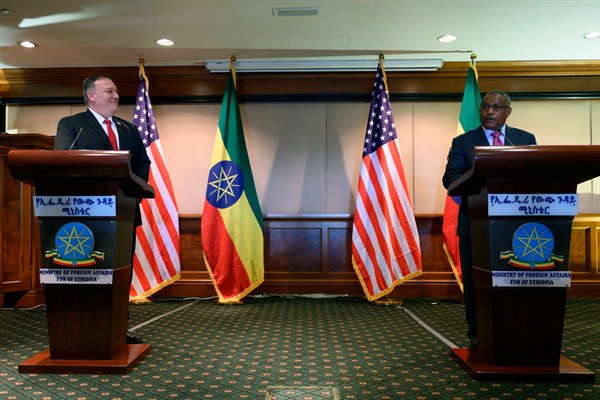If there is one good foreign policy decision Congress has made over any other in the past 20 years, it is arguably its investment in building up the U.S. Africa Command, or AFRICOM. All but shutting down AFRICOM, which the Trump administration is considering, would be one of the worst decisions it could make this year, although it’s a crowded field. Which is why it was heartening when reports surfaced this week that those mooted Pentagon plans are meeting with strong headwinds in Congress. As always with the Trump White House, it’s anyone’s guess whether logic will ultimately prevail or what surprise will come next.
Even as rumors swirled of looming Pentagon cuts to AFRICOM, Secretary of State Mike Pompeo, in Addis Ababa this week during a three-country tour of Africa, was giddily touting to African leaders the benefits of doing business with America, while warning of a dark, authoritarian future for those countries that do business with Russia and China instead. Only a few weeks ago, the Trump administration imposed a new visa ban on citizens from Nigeria, the most populous country in Africa and its largest economy, as well as Tanzania, Sudan and Eritrea. One hand takes, one gives and yet another takes away again—it’s no wonder Beijing and Moscow make for such attractive partners for so many leaders in Africa. While Pompeo promised “true liberation” and real opportunities for cooperation, some in the audience in Ethiopia’s capital had to be thinking, Is he for real?
While Trump’s chief defender in the Senate, Lindsey Graham, denied he told Defense Secretary Mark Esper that he would make his life “hell” if the Pentagon tried to zero out AFRICOM, the fact that shrinking the only viable means of keeping an ear to the ground in hotspots like the Sahel and West Africa is even on the table speaks volumes about the disarray, yet again, in Trump’s foreign policy. It took Congress a decade and several hundred million dollars to stand up and sustain a dedicated combatant command headquarters focused on Africa, and it took nearly a decade more for the roughly 1,500 American personnel who staff it to establish real operational value. The question now as the Pentagon conducts the last leg of its “zero-based budgeting review” over the next month is whether the lack of a coherent national security policy on Africa blows wider American grand strategy entirely off course.

